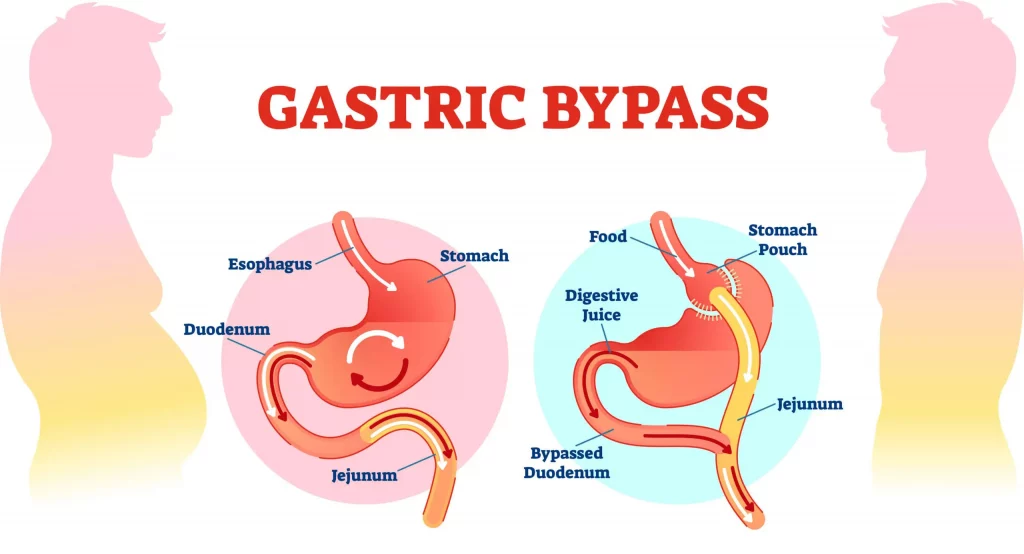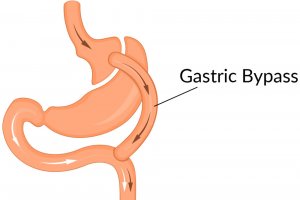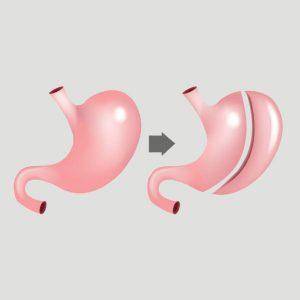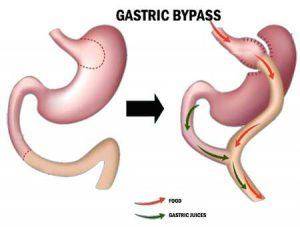Understanding benefits gastric bypass: scientific explanation
Table of Contents

Introduction
Obesity is a complex and multifactorial disease that affects millions of people worldwide. It is associated with several health problems, including diabetes, hypertension, and cardiovascular disease[1], leading to a reduced quality of life and increased healthcare costs. Although diet and exercise are the first-line treatment for obesity, for some individuals, weight loss surgery, such as gastric bypass surgery, may be a viable option.
Understanding gastric bypass surgical procedure:
That modifies the stomach and small intestine’s anatomy to restrict food intake and reduce the absorption of nutrients. This procedure has been shown to be an effective treatment for obesity, leading to significant and sustained weight loss, improved quality of life, and a reduction in obesity-related comorbidities. The scientific basis behind gastric bypass surgery lies in the modification of the gut hormones, which regulate appetite and metabolism, leading to decreased hunger and increased energy expenditure.
The benefits, gastric bypass surgery is not without risks, and it requires careful patient selection and postoperative management. In this article, we will provide an overview of the science and benefits of gastric bypass surgery, as well as its risks and considerations[2]. By understanding the science behind gastric bypass surgery and its potential benefits, individuals with obesity can make informed decisions about their treatment options and achieve long-term weight loss success.
Understanding what is gastric bypass surgery?
Gastric bypass surgery is a type of weight loss surgery that involves creating a small pouch from the stomach and rerouting the small intestine to this pouch. This procedure restricts the amount of food that can be consumed and reduces the absorption of calories and nutrients, leading to weight loss. Gastric bypass surgery is typically reserved for individuals with a body mass index (BMI) greater than 40 or those with a BMI between 35 and 40 with comorbidities such as diabetes, hypertension, and sleep apnea that are difficult to manage with non-surgical interventions.
Understanding the science behind gastric bypass surgery and its potential benefits, individuals with obesity can make informed decisions about their treatment options and achieve long-term weight loss success.
Understanding the types of gastric bypass surgery
There are two types of gastric bypass surgery: Roux-en-Y gastric bypass and biliopancreatic diversion with duodenal switch. The Roux-en-Y gastric bypass is the most common type of gastric bypass surgery[3], accounting for over 90% of all gastric bypass procedures performed. This procedure involves creating a small pouch from the stomach and connecting it directly to the small intestine, bypassing the rest of the stomach and the duodenum. The biliopancreatic diversion with duodenal switch is a more complex procedure that involves removing a larger portion of the stomach and rerouting the small intestine to both the new stomach pouch and the duodenum.
Understanding gastric bypass surgery is typically performed laparoscopically.
It involves making small incisions in the abdomen and inserting a laparoscope and other surgical instruments. This minimally invasive approach reduces the risks associated with traditional open surgery, such as bleeding, infection, and prolonged hospitalization[4]. The length of hospital stay after gastric bypass surgery is typically 2-3 days, and most individuals can return to their normal activities within 2-3 weeks.
In order to be eligible for gastric bypass surgery, individuals must meet certain criteria, including a BMI greater than 40 or a BMI between 35 and 40 with comorbidities that are difficult to manage with non-surgical interventions.
In addition, individuals must have a history of unsuccessful attempts at weight loss with non-surgical interventions and be committed to making the necessary lifestyle changes after surgery.
Science behind gastric bypass
Understanding science behind gastric bypass surgery lies in the anatomical changes made to the stomach and small intestine, which result in altered gut hormone signaling and changes in energy balance. The modification of the gut hormones has a significant impact on appetite regulation and metabolism, leading to decreased hunger and increased energy expenditure.
Gastric bypass surgery leads to rapid and sustained weight loss, which can have a profound impact on the body’s metabolic function. This is due in part to the changes in the gut hormones, which regulate appetite and metabolism. After gastric bypass surgery, there is an increase in the production of the hormone peptide YY (PYY) and glucagon-like peptide-1 (GLP-1)[5], which are associated with decreased hunger and increased satiety. These changes lead to a reduction in food intake and can result in significant weight loss.
Understanding the changes in appetite regulation, gastric bypass surgery also leads to changes in energy expenditure. After surgery, there is an increase in the resting metabolic rate, which contributes to the maintenance of weight loss over time. This increase in energy expenditure is due in part to the increased production of brown adipose tissue, which is associated with increased thermogenesis and energy expenditure.
Understanding impact of gastric bypass surgery on gut hormones and metabolism
The impact of gastric bypass surgery on gut hormones and metabolism has been shown to have a significant impact on comorbidities such as diabetes, hypertension, and sleep apnea. Studies have shown that gastric bypass surgery leads to significant improvements in glycemic control, blood pressure, and sleep apnea severity. These improvements are thought to be due to the changes in gut hormone signaling and metabolic function.
The science behind gastric bypass surgery is based on the anatomical changes made to the stomach and small intestine, which result in altered gut hormone signaling[6] and changes in energy balance. These benefits changes lead to decreased hunger, increased satiety, and increased energy expenditure, which contribute to the significant and sustained weight loss seen after surgery. The impact of gastric bypass surgery on gut hormones and metabolism also has a significant impact on comorbidities such as diabetes, hypertension, and sleep apnea, making it a potentially life-changing intervention for individuals with obesity.
Benefits of gastric bypass surgery
Regular physical activity is an essential component of long-term success post-gastric bypass surgery. It can accelerate weight loss, improve cardiovascular fitness, enhance mood, and promote better sleep [11]. Furthermore, exercise can assist in maintaining lean body mass, thus preventing excessive muscle loss commonly associated with rapid weight loss [12].
Patients are generally advised to start with light and low-impact exercises, such as walking or cycling, as soon as they are physically able. The goal is to gradually increase the duration and intensity of exercise as the body heals and adapts to the changes [13].
A balanced exercise regimen that incorporates aerobic activities, strength training, and flexibility exercises. The American Heart Association recommends at least 150 minutes of moderate-intensity aerobic activity or 75 minutes of vigorous-intensity activity per week, along with muscle-strengthening activities at least two days a week [14].
Being Patient of bypass gastric
Despite these guidelines, it’s essential to listen to your body and not push beyond your current physical capabilities. Be patient with yourself, as it may take time to build up endurance and strength. If you experience pain, dizziness, or other unusual symptoms during exercise, it’s important to stop and seek medical advice [15].
Integrating physical activity into daily life can make it less daunting. Simple changes like taking the stairs instead of the elevator, parking farther away from the store, or taking short walk breaks can significantly increase your overall activity level.
Remember, your fitness journey post-surgery is unique to you. It’s not about perfection but about making consistent efforts towards a healthier, more active lifestyle.
Quality of life post-gastric bypass surgery
The benefits of gastric bypass surgery extend beyond weight loss
Gastric bypass surgery has been shown to be an effective treatment for obesity and its associated comorbidities, and impact on an individual’s overall health and quality of life.
Significant weight loss and maintenance are the most obvious benefits of gastric bypass surgery. Studies have shown that individuals who undergo gastric bypass surgery can expect to lose between 50-70% of their excess weight within the first two years after surgery, with long-term weight loss maintenance seen up to 10 years post-surgery. This sustained weight loss can have a significant impact on obesity-related comorbidities, such as diabetes, hypertension, and sleep apnea, leading to improved overall health.
Improved quality of life is another important benefit of gastric bypass surgery. Obesity is associated with a reduced quality of life due to physical limitations, decreased mobility, and social stigmatization. After gastric bypass surgery, individuals report improvements in physical functioning, mood, and self-esteem, leading to an overall improvement in quality of life.
Reduction of obesity
Understanding of reduction in obesity-related comorbidities
Reduction in obesity-related comorbidities is perhaps the most significant benefit of gastric bypass surgery[7]. Studies have shown that gastric bypass surgery can lead to significant improvements in glycemic control, blood pressure, and sleep apnea severity. These improvements are thought to be due to the changes in gut hormone signaling and metabolic function that occur after surgery.
Understanding, gastric bypass surgery has the potential to reduce healthcare costs associated with obesity-related comorbidities. By reducing the incidence and severity of obesity-related illnesses, individuals who undergo gastric bypass surgery may require fewer medical interventions and hospitalizations, leading to overall cost savings.
The benefits of gastric bypass surgery extend beyond weight loss and can have a significant impact on an individual’s overall health and quality of life[8]. Significant weight loss and maintenance, improved quality of life, and reduction in obesity-related comorbidities are all potential benefits of gastric bypass surgery, making it a potentially life-changing intervention for individuals with obesity.
Conclusion
In conclusion, gastric bypass surgery is an effective treatment option for individuals with obesity who have been unsuccessful with non-surgical interventions. The procedure involves anatomical changes to the stomach and small intestine, which alter gut hormone signaling and lead to significant weight loss, improved quality of life, and a reduction in obesity-related comorbidities[9]. The benefits of gastric bypass surgery extend beyond weight loss, as individuals report improvements in physical functioning, mood, and self-esteem. However, the surgery is not without risks, and careful patient selection and postoperative management are crucial to ensure long-term success.
It is essential to recognize that gastric bypass surgery is not a quick fix or a cure for obesity, and it requires a significant commitment to lifestyle changes and long-term follow-up. Individuals considering gastric bypass surgery should carefully weigh the potential benefits and risks of the procedure and discuss their options with their healthcare provider.
As research continues to investigate the mechanisms behind gastric bypass surgery and its impact on health outcomes, it is likely that the procedure will become an even more effective treatment option for individuals with obesity[10]. By understanding the science behind gastric bypass surgery and its potential benefits, individuals with obesity can make informed decisions about their treatment options and achieve long-term weight loss success.
References
- Buchwald H, Avidor Y, Braunwald E, et al. Bariatric surgery: a systematic review and meta-analysis. JAMA. 2005;292(14):1724-1737.https://pubmed.ncbi.nlm.nih.gov/15479938/
- Ochner CN, Jochner MC, Caruso EA, Teixeira J, Xavier Pi-Sunyer F, Gallagher D. Effectiveness of gastric bypass surgery in a cohort of super-obese patients. Obes Surg. 2011;21(6):763-767.
- Adams TD, Gress RE, Smith SC, et al. Long-term mortality after gastric bypass surgery. N Engl J Med. 2007;357(8):753-761.https://pubmed.ncbi.nlm.nih.gov/17715409/
- Hsu LK, Benotti PN, Dwyer J, et al. Nonsurgical factors that influence the outcome of bariatric surgery: a review. Psychosom Med. 1998;60(3):338-346.
- Pories WJ, Swanson MS, MacDonald KG, et al. Who would have thought it? An operation proves to be the most effective therapy for adult-onset diabetes mellitus. Ann Surg. 1995;222(3):339-350.
- American Society for Metabolic and Bariatric Surgery. Bariatric surgery procedures. Accessed May 9, 2023.https://asmbs.org/patients/bariatric-surgery-procedures.
- Buchwald H, Avidor Y, Braunwald E, et al. Bariatric surgery: a systematic review and meta-analysis. JAMA. 2004;292(14):1724-1737.
- Schauer PR, Bhatt DL, Kirwan JP, et al. Bariatric surgery versus intensive medical therapy for diabetes – 5-year outcomes. N Engl J Med. 2017;376(7):641-651.https://pubmed.ncbi.nlm.nih.gov/28199805/
- Lee WJ, Lee YC, Ser KH, Chen JC, Su YH, Chen SC. Experience of 1,000 cases of laparoscopic mini-gastric bypass: changing the paradigm of bariatric surgery. World J Surg. 2012;36(2):322-328.
- Ponce J, Nguyen NT, Hutter M, Sudan R, Morton JM. American Society for Metabolic and Bariatric Surgery estimation of metabolic and bariatric procedures performed in the United States in 2016. Surg Obes Relat Dis. 2018;14(3):259-263.https://pubmed.ncbi.nlm.nih.gov/26476493/









